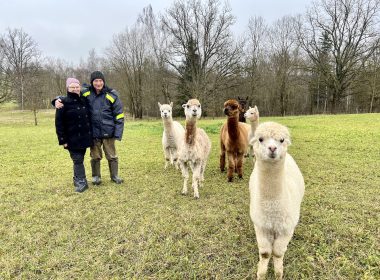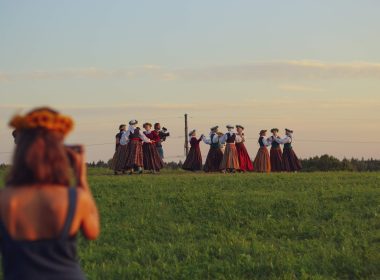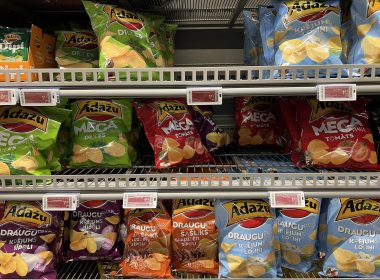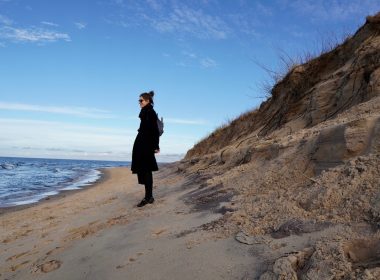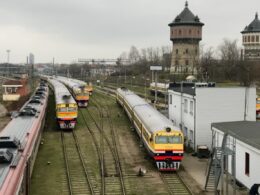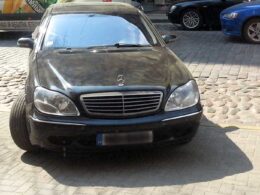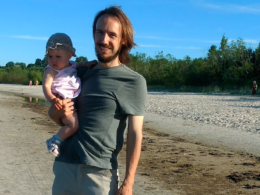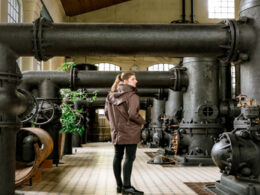It’s not every day you spot alpacas grazing by the roadside in Latvia. Cows? Of course. Sheep? Common enough. Even deer are a familiar sight. But alpacas? Now that’s something rare – and wonderfully unexpected! Yet, just a few kilometres outside Ērgļi, you’ll find a group of these graceful creatures nibbling away on the lush grass of a beautiful, wooded landscape. Both land and creatures are the pride of Ian and Joanna Storie, dedicated long-term residents of Latvia from the UK.
My family and I visited the farm – Griezītes Alpakas – last summer, receiving a deeply touching tour that lasted close to four hours yet flew by and equipped us with knowledge of alpacas and their care that we never could have imagined. When I returned in November to chat to Ian and Joanna, I once again got much more than I expected, witnessing and ever so slightly participating in cutting the toenails of some of the larger and more fidgety male alpacas. I’d long wanted to speak to someone who has moved not to Riga but rural Latvia to learn what brought them there but most importantly why they stayed.
To me, Joanna’s and Ian’s insights capture not only the essence of life in Latvia but also the experience of living with a deep sense of purpose and taking charge of one’s own life. As they’re yet to write the book many have told them to, I’m fortunate to be able to share parts of their story!
Ian and Joanna met at Sheffield University in the 1980s but describe themselves as country people. Both sets of their parents had grown their own food, which was common in the mining community Ian’s family belonged to but unusual in Joanna’s circles. Because of this upbringing and their ongoing practice of gardening and related know-how, people tell Ian and Joanna that they already have lots of the skills that others are only now trying to rediscover.
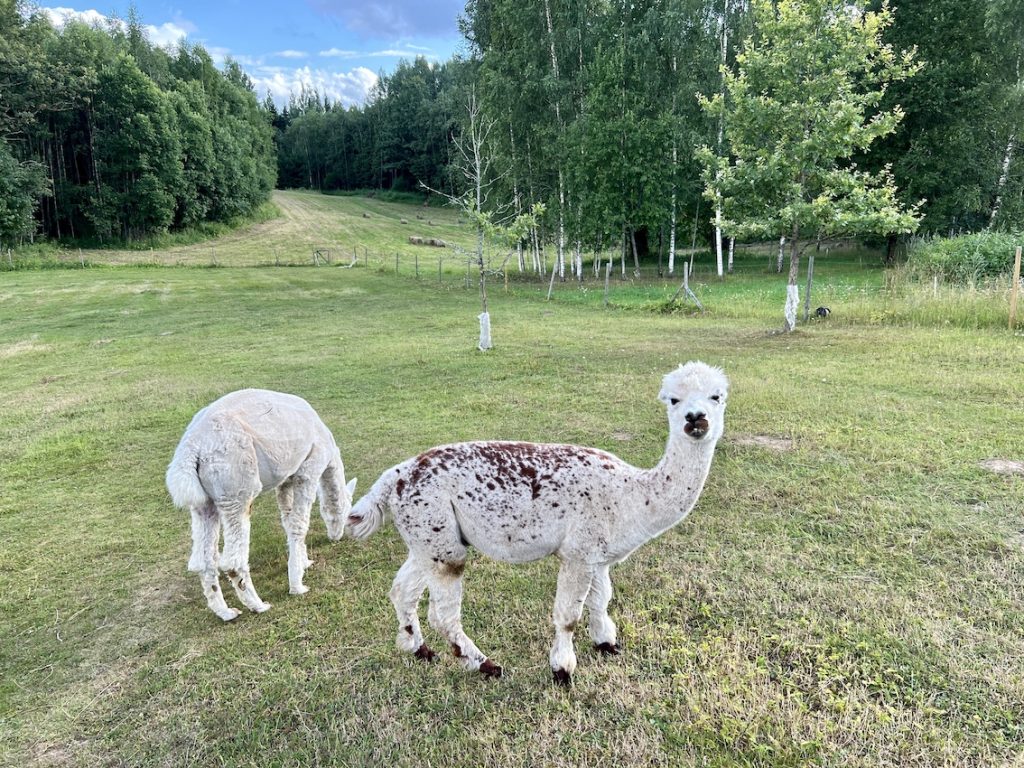
Latvia is not the first foreign country Ian and Joanna have lived in
After graduating, they moved to a village before eventually transferring to Denmark for three years and then the USA for another two for Ian’s work in the medical testing sector. At the suggestion of a friend, they first came to Latvia in 2000 to volunteer at a children’s camp and continued to fly over in the summers to come. At one point, friends who were living in Ērgļi offered Ian and Joanna to buy their apartment, so they did, seeing it as a “foot in the door” and a reason to spend more time in Latvia. At the time, the price was also very inviting, especially compared to properties in other countries.
Feeling like they’d had enough of the USA, they figured they’d move to Latvia since they had the apartment. And so they did. Thinking they’d have to find work, Ian got in touch with an organisation doing the kind of testing he specialised in. Enter an insightful story about Latvia in the late 2000s… Firstly, the organisation couldn’t afford to pay Ian, so he volunteered for them. Secondly, having seen the machines they operated with and how they processed the specimens, Ian wasn’t convinced about the quality of their work to say the least. He wasn’t surprised that things went quiet there after a while!
As luck would have it, the same friends who’d sold the apartment to Joanna and Ian, asked them if they wouldn’t mind looking after a piece of land they had. And that was the beginning of the alpaca chapter in their lives, but that is a story best told by Ian himself on a small group (!) tour of the farm. With time, when the law changed to allow foreigners to purchase agricultural land in Latvia, they bought it.
Meanwhile, Joanna, who had completed a master’s in sustainable rural development, thinking it could be useful here, began seeking PhD opportunities and found them in Estonia, having received zero response from contacts in Latvia. Having completed her PhD in landscape architecture and sense of place, she now continues working at the Estonian University of Life Sciences, travelling to Tartu for a few days every month.
Alongside her work and farm duties, Joanna is learning Latvian with the hopes of getting citizenship. Considering where they live, the classes happen online. As much as Ian would like to learn Latvian, unfortunately, his mind isn’t designed for learning languages. For now, they’re quite dependent on friends to help manage aspects such as the local bureaucracy.
They had a fantastic experience with another Lelde, an intern on placement from Vidzeme University, who assisted with much more than language during her three-month stint at Griezītes Alpakas. In an ideal world, Ian and Joanna would hire someone like her part time, however, they couldn’t afford the taxes associated with that – one of the realities of running a small business in a small market.
The role of attitude in adapting to a new place
Speaking of friends and colleagues, the Stories are great believers in making networks in the local community if you intend to live in a place long term. Ian remembers reading something about happiness levels going up and down when you move abroad, and how the dip can get quite deep once the initial excitement and novelty have worn off. It’s at that point that you start saying stuff like “things were much better at home”. He went through that in Denmark but one moment completely changed things. They’d gone back to check up on their property in the UK.
“I remember being there, standing in front of the house and looking out at the fields, and a voice in my head going “say goodbye”. So, I was like “goodbye tree, goodbye electric post”, and when I got back to Denmark, I felt so much better. It was about saying goodbye to what I was clinging on to,” Ian recalls.
A lot comes down to attitude in the Stories’ experience. Joanna draws parallels between the way that some foreigners insist, “I have this knowledge that you’re going to have”, and students’ attitude towards learning. “I tell the students what I’m teaching them this month might not be relevant in two, three or four months,” she says, implying that learning is fundamentally about attitude – just as living is – because what you know may not always be enough or applicable.
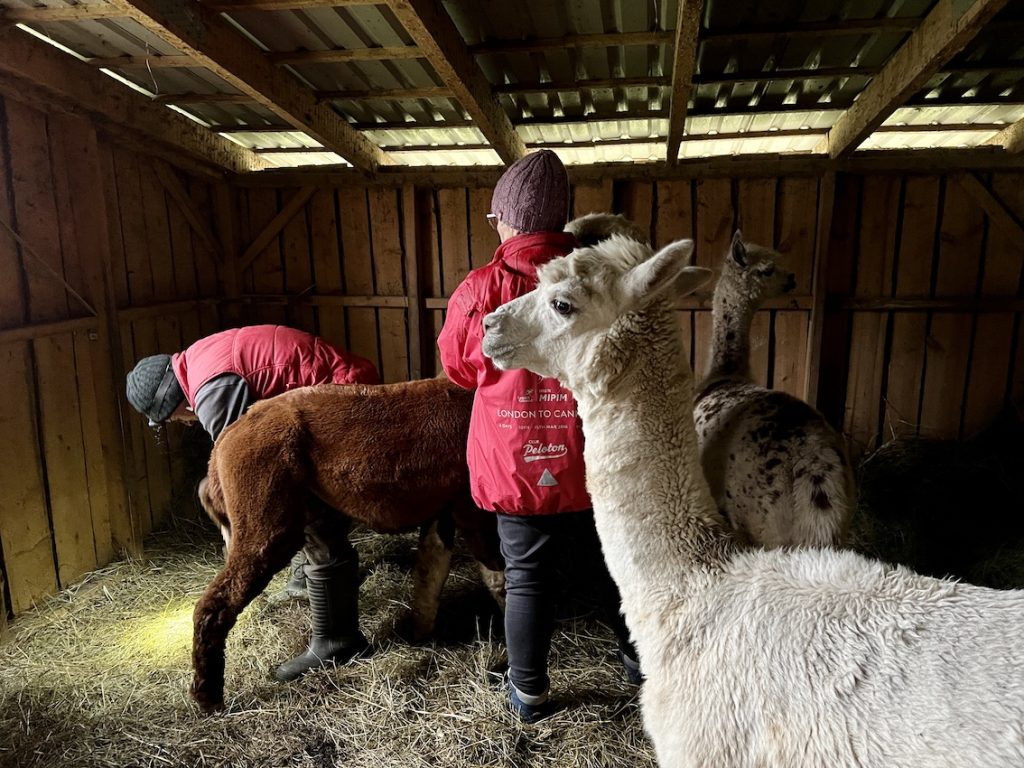
How has Latvia changed over the years?
Since Ian and Joanna have lived in Latvia for 16 years, I wonder what cultural, social or other changes they’ve observed.
Ian mentions “fewer little officialdom empires”, which is when certain authorities like to assert their place in the mythical hierarchy. Getting information can still be an issue though, with people seemingly afraid that you might use their knowledge to become their competition. Joanna knows this from academic circles too, noting that Latvians tend to congregate amongst themselves, although things are changing now.
Sadly, they’ve both noticed that the creativity and resourcefulness they witnessed in their first years at the children’s camps are gone. At the time, the kids would be told to go into the woods and make a hat for their leader or something. “The creativity was phenomenal! But, as time went on, things became much more prescriptive and formulaic,” says Ian, adding that “that thinking and problem solving – a lot of that has gone now”. Joanna puts it down to bringing ideas in from other places instead of building on what was already here. At the same time, when she asked her students in Estonia how many of them know how to garden, every hand went up – except those of the students from Norway and France.
Changing practices have also led to noticeable differences in the landscape. Joanna recalls seeing haycocks in their first few years in Latvia, whereas recently, she’s only seen them in one very wet year, when it was a bit too difficult for the heavy machinery.
Another observation is that locals speak a lot more English these days – they might not feel confident but definitely understand.
Interestingly, although Latvia promotes itself as a digitally advanced society, Ian and Joanna find many of the systems are still quite terrible from a user’s perspective. Since Joanna works in Estonia, she can compare the two and finds the ones across the border more functional. They find it frustrating that Latvia insists on developing its own systems when it could follow the example of its neighbour but it won’t do that, will it?
Ian and Joanna have also noticed a shift in attitudes towards foreigners. When they first came to Latvia, they felt they were perhaps even more trusted because they were foreign, whereas now they’re no longer sure. Additionally, “it’s gone from “poor Latvians” as in “poor us, we don’t know anything” to a creeping nationalism, which is concerning,” says Joanna, noting that this is happening in a lot of countries. For Ian this is a real worry because, as someone who struggles with learning languages, he doesn’t know what he’d do if he’d need to know Latvian to retain his residency.
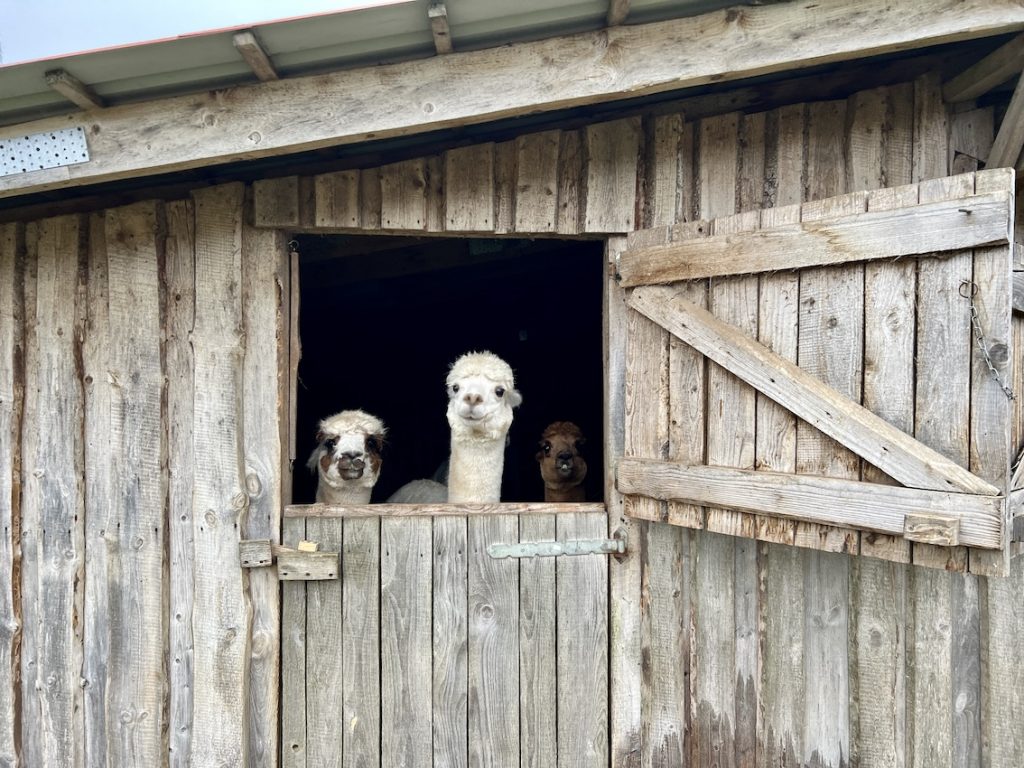
On belonging to a place
Ian shares a nightmare he had, in which russia had decided to invade and he wondered: “What would I do? The British government would probably put on flights but would I go? Our life’s here. We’ve got kids and grandkids in the UK but the land and the alpacas are here, and they’re my life. It would be easy to take the flight but my neighbours and friends can’t do that! In the dream I ended up choosing about four alpacas, packing the car up, putting them in the horse box and letting the other alpacas loose.”
“To be honest, I’d quite like to die here. I feel so connected to HERE. It’s heaven for me to be able to do the stuff that I do. I’d really struggle having to work in an office. I need the space and to see the sky and trees. If this hadn’t happened, I think I’d have had a mental breakdown,” Ian continues.
So, what is the very essence of why things have worked out for them in Latvia? “It’s quiet! And there’s space,” says Joanna. They’re not sure if other parts of Latvia, like Liepāja and Ventspils, would have had the same effect on them. It was also just a question of timing.
When they told their children that they were moving to Latvia, they’d responded by saying “well, that’s just mum and dad” and that they’re weird but at least they’re doing something interesting.
—–
If you’ve found value in reading Life in Riga, please consider supporting the blog to ensure many more future stories! Thank you.


